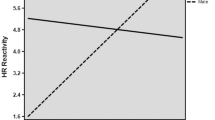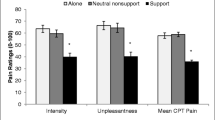Abstract
Background: Previous research has identified trait hostility and social isolation as possible psychosocial risk factors for coronary heart disease (CHD). However, few studies have examined hostility and social support simultaneously to determine their independent and possible interactive relations with CHD and disease-promoting mechanisms.Purpose: Hypotheses derived from a general interpersonal model were tested in a study examining trait hostility and perceived social support as predictors of cardiovascular reactivity to laboratory stressors.Methods: Healthy college students (53 men, 55 women) performed speech and mental arithmetic tasks while blood pressure and heart rate were monitored.Results: There was an interactive effect of hostility and perceived social support on systolic and diastolic blood pressure (SBP and DBP) reactivity. Higher hostility scores were associated with greater SBP reactivity for participants who were high in perceived social support; whereas for those with low social support scores, greater hostility was associated with somewhat less SBP reactivity. The same pattern was obtained for DBP, but only during the speech task.Conclusions: These findings encourage further research conceptualizing trait hostility within a general interpersonal framework that calls attention to both positive and negative person-environment transactions.
Similar content being viewed by others
References
Smith TW, Ruiz JM: Psychosocial influences on the development and course of coronary heart disease: Current status and implications for research and practice.Journal of Consulting and Clinical Psychology. 2002,70:548–568.
Miller TQ, Smith TW, Turner CW, Guijarro ML, Hallet AJ: A meta-analytic review of research on hostility and physical health.Psychological Bulletin. 1996,220:322–348.
Berkman LF: The role of social relations in health promotion.Psychosomatic Medicine. 1995,57:245–254.
Angerer P, Siebert U, Kothny W, et al.: Impact of social support, cynical hostility and anger expression on progression of coronary atherosclerosis.Journal of the American College of Cardiology. 2000,36:1781–1788.
Knox SS, Siegmund KD, Weidner G, et al.: Hostility, social support, and coronary heart disease in the National Heart, Lung, and Blood Institute Family Heart Study.American Journal of Cardiology. 1998,82:1192–1196.
Knox SS, Adelman A, Ellison RC, et al.: Hostility, social support, and carotid artery atherosclerosis in the National Heart, Lung, and Blood Institute Family Heart Study.American Journal of Cardiology. 2000,86:1086–1089.
Manuck SB: Cardiovascular reactivity in cardiovascular disease: “Once more unto the breach.”International Journal of Behavioral Medicine. 1994,1:4–31.
Suls J, Wan CK: The relationship between trait hostility and cardiovascular reactivity: A quantitative review and analysis.Psychophysiology. 1993,30:615–626.
Uchino BN, Cacioppo JT, Keicolt-Glaser JK: The relationship between social support and physiological processes: A review with emphasis on underlying mechanisms and implications for health.Psychological Bulletin. 1996,119:488–531.
Gallo LC, Smith TW: Patterns of hostility and social support: Conceptualizing psychosocial risk factors as characteristics of the person and the environment.Journal of Research in Personality. 1999,33:281–310.
Smith TW: Concepts and methods in the study of anger, hostility, and health. In Siegman AWS, Timothy W (eds),Anger, Hostility, and the Heart. Hillsdale, NJ: Lawrence Erlbaum Associates, Inc., 1994, 23–42.
Kiesler DJ: The 1982 Interpersonal Circle: A taxonomy for complementarity in human transactions.Psychological Review. 1983,90:185–214.
Wiggins JS: A psychological taxonomy of trait-descriptive terms: The interpersonal domain.Journal of Personality and Social Psychology. 1979,37:395–412.
Holt-Lunstad J, Uchino BN, Smith TW, Olson-Cerny C, Nealey-Moore JB: Social relationships and ambulatory blood pressure: Structural and qualitative predictors of cardiovascular function during everyday social interactions.Health Psychology. 2003,22:388–397.
Smith TW, Gallo LC, Goble L, Ngu LQ, Stark KA: Agency, communion, and cardiovascular reactivity during marital interaction.Health Psychology. 1998,17:537–545.
Belsky J, Cassidy J: Attachment: Theory and evidence. In Rutter M, Hay DF (eds),A Handbook for Clinicians. Oxford, England: Blackwell, 1994, 373–402.
Benjamin LS: Structural analysis of social behavior.Psychological Review. 1974,81:392–425.
Caspi A, Bem DJ, Elder GH: Continuities and consequences of interactional styles across the life course.Journal of Personality. 1989,57:375–406.
Gallo LC, Smith TW, Kircher JC: Cardiovascular and electrodermal responses to support and provocation: Interpersonal methods in the study of psychophysiological reactivity.Psychophysiology. 2000,37:289–301.
Hardy JD, Smith TW: Cynical hostility and vulnerability to disease: Social support, life stress, and physiological response to conflict.Health Psychology. 1988,7:447–459.
Kamarck TW, Annunziato B, Amateau LM: Affiliations moderates the effects of social threat on stress-related cardiovascular responses: Boundary conditions for a laboratory model of social support.Psychosomatic Medicine. 1995,57:183–194.
Piferi RL, Lawler KA: Hostility and the cardiovascular reactivity of women during interpersonal confrontation.Women and Health. 2000,30:111–129.
Smith MA, Houston B: Hostility, anger expression, cardiovascular responsivity, and social support.Biological Psychology. 1987,24(1):39–48.
Lepore SJ: Cynicism, social support, and cardiovascular reactivity.Health Psychology. 1995,14:210–216.
Brownley KA, Light KC, Anderson NB: Social support and hostility interact to influence clinic, work, and home blood pressure in Black and White men and women.Psychophysiology. 1996,33:434–445.
Cohen S, Hoberman HM: Positive events and social supports as buffers of life change stress.Journal of Applied Social Psychology. 1983,13:99–125.
Turner-Cobb JM, Sephton SE, Koopman C, Blake-Mortimer J, Spiegel D: Social support and salivary cortisol in women with metastatic breast cancer.Psychosomatic Medicine. 2000,62:337–345.
Cook WW, Medley DM: Proposed hostility and Pharisaic-virtue scales for the MMPI.Journal of Applied Psychology. 1954,38:414–418.
Guyll M, Contrada RJ: Trait hostility and ambulatory cardiovascular activity: Responses to social interaction.Health Psychology. 1998,17:30–39.
Weidner G, Friend R, Ficarrotto TJ, Mendell NR: Hostility and cardiovascular reactivity to stress in women and men.Psychosomatic Medicine. 1989,51:36–45.
Baron RM, Kenny DA: The moderator-mediator variable distinction in social psychological research: Conceptual, strategic, and statistical considerations.Journal of Personality and Social Psychology. 1986,51:1173–1182.
MacKinnon DP, Lockwood CM, Hoffman JM, West SG, Sheets V: A comparison of methods to test mediation and other intervening variable effects.Psychological Methods. 2002,7(1):83–104.
Uchino BN, Holt-Lunstad J, Uno D, Flinders JB: Heterogeneity in the social networks of young and older adults: Prediction of mental health and cardiovascular reactivity during acute stress.Journal of Behavioral Medicine. 2001,24:361–382.
Uno D, Uchino BN, Smith TW: Relationship quality moderates the effect of social support given by close friends on cardiovascular reactivity in women.International Journal of Behavioral Medicine. 2002,9:243–262.
Gambone GC, Contrada RC: Patterns of self-and other-representation in trait hostility.Journal of Social and Clinical Psychology. 2002,21:546–565.
Smith TW, Pope MK, Sanders JD, Allred KD, O'Keeffe JL: Cynical hostility at home and work: Psychosocial vulnerability across domains.Journal of Research in Personality. 1988,22:525–548.
Fritz HL,Nagurney AJ,Helgeson VS: Social interactions and cardiovascular reactivity during problem disclosure among friends.Personality and Social Psychology Bulletin. 2003,29:713–725.
Author information
Authors and Affiliations
Corresponding author
Additional information
Yung Chen is now at Duke University Medical Center. Suzanne Gilligan is now at the Consortium for Advanced Psychological Training, Michigan State University. Elliot Coups is now at Memorial Sloan-Kettering Cancer Center, Department of Psychiatry and Behavioral Sciences.
About this article
Cite this article
Chen, Y.Y., Gilligan, S., Coups, E.J. et al. Hostility and perceived social support: interactive effects on cardiovascular reactivity to laboratory stressors. ann. behav. med. 29, 37–43 (2005). https://doi.org/10.1207/s15324796abm2901_6
Issue Date:
DOI: https://doi.org/10.1207/s15324796abm2901_6




